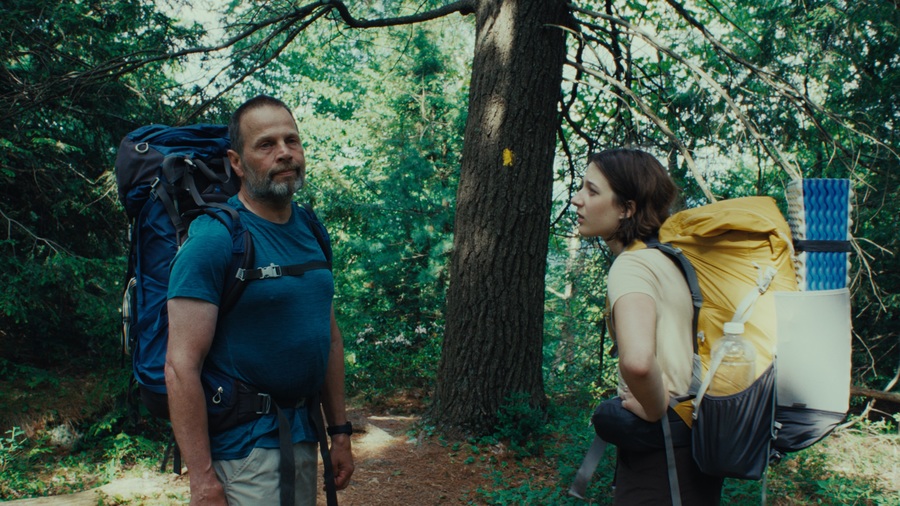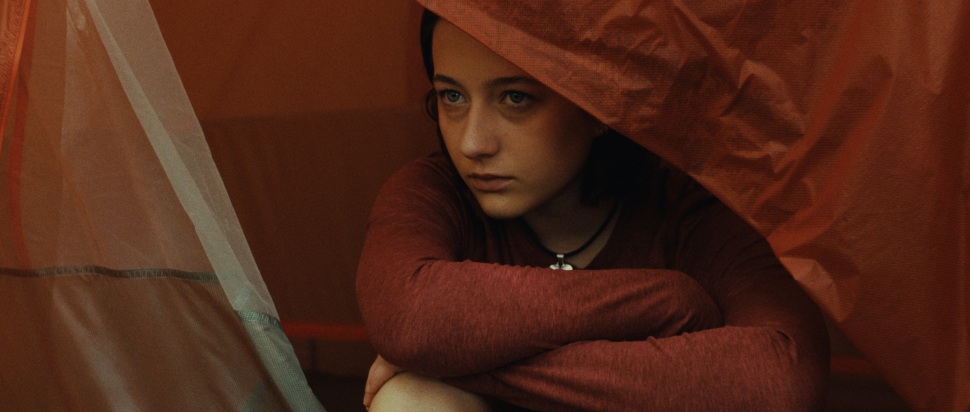India Donaldson on Good One
India Donaldson's debut feature, Good One, is a striking portrait of a father-daughter relationship. She talks to us about girlhood, empathetic writing and the ‘man or bear’ debate her protagonist could’ve started
"Look what you made. You’ve got a good one," Matt tells his longtime friend Chris during a backpacking trip in India Donaldson’s first feature. The burden of this almost backhanded compliment — a line that gives Donaldson’s film its title, Good One — falls heavy on Chris’s 17-year-old daughter Sam, portrayed by Lily Collias in an impressive breakout turn.
Sam says very little during her woodland odyssey with her dad and his newly divorced pal, but her expressive face captures the unique challenges of girlhood. “The film is very personal,” Donaldson explains over Zoom. While her younger self may not have been on this exact hike in the Catskills, the Los Angeles-based writer-director certainly tapped into her “cumulative experience of having been a teenage girl at one point in my life”. She's poured her micro-memories into the movie, collating tiny moments "where I felt uncomfortable in the world that seemed totally insignificant at the time, but now, in the context of something later, become more significant”.
Removing her tampon in the woods isn’t the most awkward incident Sam experiences in this poetic yet matter-of-fact coming-of-age film. “Like many of us, [Sam]’s sort of been conditioned by the world that she lives in, by her family, to be good and obedient, helpful, thoughtful,” Donaldson says. This eager-to-please demeanour clashes with a fiercely independent spirit, building up to a crisis. “She’s intensely capable and able, but then on the other side of the coin is that the men around her, these two men in particular, take advantage of how willing she is to be that helpful caretaker.”
Played by James Le Gros and Danny McCarthy, Chris and Matt bounce off each other in a bickering, at times unkind friendship that may have just gone past its expiration date. There are echoes of Kelly Reichardt’s Old Joy in Good One, with the 2006 movie providing one of the inspirations for the souring relationship between these two men. Despite Chris and Matt's many shortcomings, which will grow apparent to Sam during the trip, Donaldson’s writing affords them great empathy. “For the film to have any impact at all emotionally, I think you have to kind of care about these guys,” she explains.

Good One. Image courtesy of CONIC.
In between eye-rolls and humbling comebacks, Sam does care, which makes the turning point of Good One all the more sobering. “Over the course of these three days, she experiences this profound disappointment, and that has layers to it,” Donaldson continued. Contradictions lie at the heart of who Chris and Matt are, and they lure an uncertain Sam into their passive-aggressive, egotistic exchanges. Later in the film, Chris doesn’t return the favour and fails to show up for his daughter, and it's one of the film’s most affecting scenes. “It’s a moment where his idea of himself is challenged and that is more important to him than just acknowledging his daughter,” Donaldson suggests.
In the ‘man or bear’ scenario — a "hilarious coincidence" for the filmmaker, who didn’t find out about the internet debate on women’s safety until after the movie had wrapped — Sam finds herself in the company of men. “It was important to me that it truly be all men that she encounters,” Donaldson says. “It was pushing this idea of what it means to be a girl alone in the woods. And sometimes, a threat is not a threat, but it sucks to be a young girl and have to feel that threat at all.”
Female characters may inhabit the periphery of Good One, but play crucial, tangible roles nonetheless. “I wanted [Sam] to be surrounded by the presence of these other women who are not [there] in the moment,” the director explains. From Sam’s girlfriend, Jessie, to her mum, April, and Chris’s new partner, Casey, there's an array of offscreen women whose stories are misconstrued by the men. These women may not talk to each other, but one feels that their experiences of existing in the world, as women, are strikingly similar. “I have a younger sister and an older sister, and we all have very different and yet similar accounts [of being a teenage girl],” Donaldson says of having an open dialogue with the women in her life. “Knowing that my mum grew up in the 60s and 70s, How different was it? It was very different, and also not different at all.”
Good One doesn’t solely analyse our responsibilities in perpetuating gender stereotypes but also attempts the near-impossible feat of capturing a moment in time within shifting familial dynamics. “[I’m] maybe more so interested in family, not necessarily your blood-related family, but those deep relationships that span a long time and the complexities of how those evolve and their moments of transition,” Donaldson tells me. “I think I will always return to girlhood and that perspective at some point. I mean, I would love to make another movie with Lily one day.” That won't be the project she's currently working on, unfortunately, as Donaldson explains it's “all about men”.
After conjuring up this poignant cross-generational portrait in a 12-day shoot, Donaldson has become a filmmaker to watch, whichever trail she embarks on next.
Good One is released 16 May by CONIC
